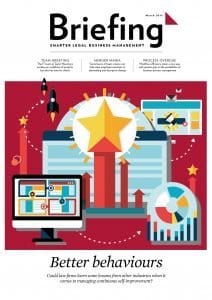
DAC Beachcroft
Rear view:
Game for change
p40

Could law firms learn more about managing continuous self-improvement?
The IT team at Taylor Wessing is working on a plethora of projects, but also has time for clients
Some basics of brain science can help steer employee reactions to demanding and disruptive change
Workflow efficiency enters a new age with greater grip on the possibilities of business project management

Rear view:
Game for change
p40

Up front:
Lex pop
p7

Up front:
What's on your radar?
p9

Opinion:
Alternative mood music
p11

Opinion:
Role models for change
p12

The big idea:
Better behaviours
p14

Features:
Better behaviours
p14

Industry interview:
Resetting storage
p34

Team profile:
Client faces
p20

Team profile:
Client faces
p20

Team profile:
Client faces
p20
 So it appears to be one more point to ‘team machine’ in the fierce battle waging over who’s going to be doing all the hard work in the future. I refer, of course, to those ever-advancing rows of artificially intelligent players eager to replace your feebly human – however professionally-trained – fingertips. Why bring it up? Two reasons. In this month’s great content mix we finally get around to reviewing The Future of the Professions (how technology will transform the work of human experts) by Professor Richard and Daniel Susskind.
So it appears to be one more point to ‘team machine’ in the fierce battle waging over who’s going to be doing all the hard work in the future. I refer, of course, to those ever-advancing rows of artificially intelligent players eager to replace your feebly human – however professionally-trained – fingertips. Why bring it up? Two reasons. In this month’s great content mix we finally get around to reviewing The Future of the Professions (how technology will transform the work of human experts) by Professor Richard and Daniel Susskind.
If that’s not enough, our cover story takes a dive into the world of continuous improvement
(coincidentally, the subject of last month’s book review). That’s all about finding incremental efficiency gains. Improving the quality of your end product, sure – but also, let’s be frank, doing stuff cheaper. The formula behind predictive coding seems to be that having higher-skilled folk ‘training’ software to appreciate the relevance of something is ultimately a more cost-effective route than having many more junior lawyers slogging away at documents for that much longer.

Law firms may have more in common with the whirlwind world of maufacturing than they think. Can legal business learn from business process in manufacturing and retail – or even actual rocket science – when it comes to learning to make the daily grind of law firms smoother and smoother?
The IT director at Taylor Wessing has a team around him that he can take anywhere – even out to clients. The IT team are each experts in their own right, which gives them extra value to clients as well as the firm.
A new centre in Northern Ireland is backing up iManage’s mission to provide law firms with a holistic approach to the data governance of huge volumes of sensitive client documents and emails, says Neil Araujo.

